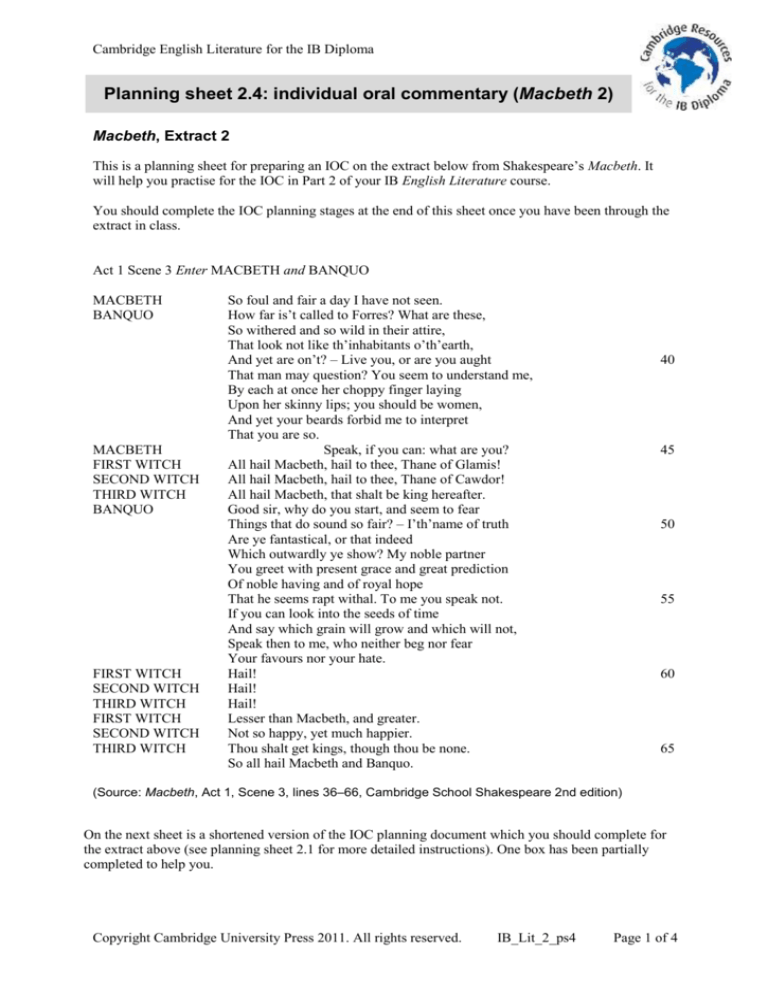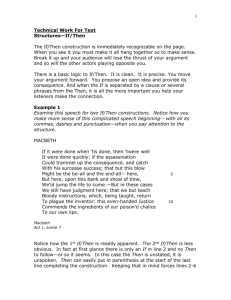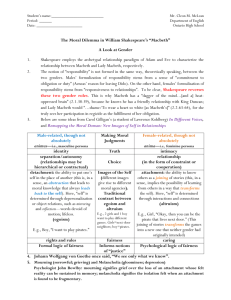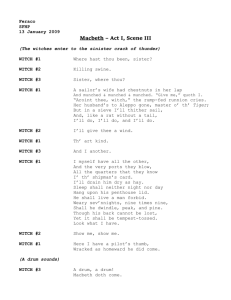
Cambridge English Literature for the IB Diploma
Planning sheet 2.4: individual oral commentary (Macbeth 2)
Macbeth, Extract 2
This is a planning sheet for preparing an IOC on the extract below from Shakespeare’s Macbeth. It
will help you practise for the IOC in Part 2 of your IB English Literature course.
You should complete the IOC planning stages at the end of this sheet once you have been through the
extract in class.
Act 1 Scene 3 Enter MACBETH and BANQUO
MACBETH
BANQUO
MACBETH
FIRST WITCH
SECOND WITCH
THIRD WITCH
BANQUO
FIRST WITCH
SECOND WITCH
THIRD WITCH
FIRST WITCH
SECOND WITCH
THIRD WITCH
So foul and fair a day I have not seen.
How far is’t called to Forres? What are these,
So withered and so wild in their attire,
That look not like th’inhabitants o’th’earth,
And yet are on’t? – Live you, or are you aught
That man may question? You seem to understand me,
By each at once her choppy finger laying
Upon her skinny lips; you should be women,
And yet your beards forbid me to interpret
That you are so.
Speak, if you can: what are you?
All hail Macbeth, hail to thee, Thane of Glamis!
All hail Macbeth, hail to thee, Thane of Cawdor!
All hail Macbeth, that shalt be king hereafter.
Good sir, why do you start, and seem to fear
Things that do sound so fair? – I’th’name of truth
Are ye fantastical, or that indeed
Which outwardly ye show? My noble partner
You greet with present grace and great prediction
Of noble having and of royal hope
That he seems rapt withal. To me you speak not.
If you can look into the seeds of time
And say which grain will grow and which will not,
Speak then to me, who neither beg nor fear
Your favours nor your hate.
Hail!
Hail!
Hail!
Lesser than Macbeth, and greater.
Not so happy, yet much happier.
Thou shalt get kings, though thou be none.
So all hail Macbeth and Banquo.
40
45
50
55
60
65
(Source: Macbeth, Act 1, Scene 3, lines 36–66, Cambridge School Shakespeare 2nd edition)
On the next sheet is a shortened version of the IOC planning document which you should complete for
the extract above (see planning sheet 2.1 for more detailed instructions). One box has been partially
completed to help you.
Copyright Cambridge University Press 2011. All rights reserved.
IB_Lit_2_ps4
Page 1 of 4
Cambridge English Literature for the IB Diploma
Guiding question 1:
Guiding question 2:
Theme/idea 1:
How does Shakespeare first introduce Macbeth and what is dramatically
interesting about this scene?
How does Shakespeare make the language of this scene interesting and
resonant?
This extract includes the key theme of unnaturalness: everything is not as it
should be – it is ‘weird’, abnormal.
Theme/idea 2:
Theme/idea 3:
Introduction to commentary
Theme/idea 1
Quotations to support idea
Notes on language/structure/form
So foul and fair a day I have not seen.
This is Macbeth’s first line of the play.
Macbeth picks up on the witches’ words ‘foul’
and ‘fair’, perhaps suggesting a link between
them.
The most obvious meanings of ‘foul’ and ‘fair’
are: a bad day (weather) and a good day
(victory), but may refer to good and bad in other
ways too. For example, good and bad behaviour,
and good and bad morality.
Looking at the pattern of line – strict iambic
pentameter – and comparing with the witches’
line: ‘fair is foul and foul is fair’, the rhythm is
inverted and changed. This may imply that things
have been turned upside down in this world –
that normal rules don’t apply.
Copyright Cambridge University Press 2011. All rights reserved.
IB_Lit_2_ps4
Page 2 of 4
Cambridge English Literature for the IB Diploma
Theme/idea 2
Quotations to support idea
Notes on language/structure/form
Copyright Cambridge University Press 2011. All rights reserved.
IB_Lit_2_ps4
Page 3 of 4
Cambridge English Literature for the IB Diploma
Theme/idea 3
Quotations to support idea
Notes on language/structure/form
Conclusion to commentary
Copyright Cambridge University Press 2011. All rights reserved.
IB_Lit_2_ps4
Page 4 of 4










